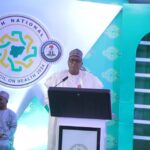In a collaborative effort to advance Women’s Economic Empowerment (WEE) initiatives, the federal government and the National Institute for Policy and Strategic Studies (NIPSS) have hosted a one-day workshop with the primary goal of fostering dialogue among officials and providing the identification of effective indicators required for the coordination, monitoring and evaluation of WEE projects across the country.
The workshop, organised by the Development Research and Projects Centre (dRPC), brought together stakeholders in Abuja to discuss the critical issue of revising and validating indicators for monitoring and evaluating WEE programmes.
Director of Projects, dRPC, Stanley Ukpai, stressed the importance of the conference and its role in advancing effective methods for women’s economic empowerment in his opening remarks.
Representing the Executive Director, Judith-Ann Walker, Ukpai emphasised the necessity of collaborative efforts in attaining tangible results in WEE activities.
- Towards women’s inclusion in tech ecosystem
- Chamber renovation: Reps shift resumption date to April 23
He said, “As we delve into the technicalities of this workshop, let us be cognizant of the fact that the indicators we seek to harmonize and validate are more than mere metrics; they are the lenses through which we will measure our progress, the tools with which we will forge a path forward, and the beacons that will guide our policies and actions.”
During his keynote address, the Director General of the National Institute for Policy and Strategic Studies (NIPSS), Ayo Omotayo, represented by a staff of the institute, noted that it was important for stakeholders to draw up feasible indicators in the WEE policy that will be highly impactful.
He said, “As we harmonise and validate the indicators in the WEE Policy, Action Plan and M&E Framework, I urge us to please consider the efficiency, effectiveness and relevance of the WEE policy intervention; the sustainability of WEE intervention results; the level of stakeholders and beneficiaries’ satisfaction with the results and whether the policy frameworks are effective to achieve maximum impact.

 Join Daily Trust WhatsApp Community For Quick Access To News and Happenings Around You.
Join Daily Trust WhatsApp Community For Quick Access To News and Happenings Around You.


